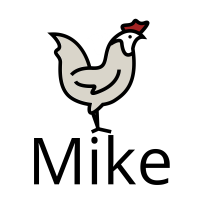For me, it may be that the toilet paper roll needs to have the open end away from the wall. I don’t want to reach under the roll to take a piece! That’s ludicrous!
That or my recent addiction to correcting people when they use “less” when they should use “fewer”


The word “literally” has been forever ruined by people who use it to mean “figuratively.” Worse, there is now literally no way to actually convey the original meaning of the word “literally” in a concise, clear way.
You have to say something like, “A is literally 10 times bigger than B…and I mean that ACTUALLY literally.” And then people will STILL assume that you’re speaking figuratively.
There literally-literally is.
And to over-egg that particular
puddingpoint, word doubling might be a common thing in “simpler” languages and, ahem, pooh-poohed in “complex” ones, but that second “literally” restores the original meaning.For now.
Until some bright spark starts using “literally literally” to mean “figuratively” anyway.
It is a fact that A is 10 times bigger.
Figurative feelings don’t care about your literal facts.
Don’t worry, people will create a new phrase soon það you’ll have some years before that one gets ruined also.
“exactly 10 times bigger” or maybe “legit 10 times bigger” can be used in a simalar way.
But language changes so me being stupid and wrong is also correct 🤔
The same can be said about “ignorant”. Calling a person ignorant because they say something that peeves you, doesn’t make them ignorant. It makes them infuriating. Idk how often people use the word ignorant in this way, but my mother does and doesn’t get it when I call her ignorant about ignorant.
Relevant
This one exactly. But don’t lose hope, the word doesn’t really convey figuratively other than online people who mostly sound foolish trying to push buttons. It is usually used as an emphasis when someone wants to say how close to the actual literal situation things were (even if not literally the same). People who use it as “figuratively” are in decline, kind of like people that throw a fit over “moist” and as long as we keep pointing out how ridiculous they are (both moist dramatics and literal confusers) their relevance will continue to fade.
Right with ya. I literally refuse to use the word when I mean figuratively.
Wait are you being literal right now? Like, actually??
Yes. And by actually, I of course mean facetiously, because language changes.
That’s how language works.
Many words shifted meaning over time, some gained connotation, some lost it, some turned to something completely different.
Just look at the word “gay”, it shifted from “happy” to “haha homosexuals are outwardly happy, so we call them gay semi-ironically” to “homosexual”. The homophobic connotation was added, then the original meaning got lost.
You can complain, sure, but just read an old text from the 17th century and try to find a sentence that means exactly the same today as it did back then.
I’m fine with language evolving; my issue is that there used to be a word that succinctly conveyed a particular idea, and now there is no way to concisely convey that idea in English.
“Gay” changing its meaning isn’t the same thing, because there are still plenty of ways of saying “happy” in English.
Are there ways to say exactly this kind of happy? I’m pretty sure, happy and gay didn’t mean exactly the same. Synonyms rarely are drop in replacement.
But yes, there is a gap now. That might get filled with another word, or people get better at discerning ironic and unironic meaning. Or maybe people stop using it in this way - groovy or rad aren’t exactly common today either.
Don we now our gay apparel
And we’ll all feel gay when Johhny comes marching home
Deutchland is happy and gaaaaaaay!
we’ll have a gay old time
Gay refers to party happiness. Places where Celebrate by Kool and the Gang would be played as a reference. Places where people dance to disco. Places where the Grinch would look on and feel embittered.
Festive.
I agree. I understand the need for a more relaxed and less clinical way of saying gay, but I still don’t understand how a word became its own antonym. I’m ESL so I tend to pay attention to words that native speakers don’t and that’s my only explanation.
I never called things “gay” growing up, I found it disparaging and offensive.
I came out as queer in my 20s. Now I ironically say “shit’s gay” and stuff like that all the time hahaha
“That’s our word”
It’s like an angel getting its wings, except with my first same-sex experience I got the card.
Try using “precisely” or “roughly” where applicable. It lets people know you’re talking about firm realities and aren’t using hyperbole.
It’s a stupid, imperfect workaround and I hate that it’s necessary, but it’s the best we have for a decade or three until people stop bastardizing “literally”.
I has been used figuratively for literal centuries.
It does bug me when the context needs clarity and the person won’t clarify which way they mean it.
Literally can mean literally ( My girlfriend literally stabbed me in the back. I’m bleeding out and need an ambulance. )
It can also mean emphatically ( My girlfriend stabbed me in the back. She emptied my bank account, shot my dog and left town with my best friend. )
I won’t use it in the latter way, and will sometimes use the adjective proverbial ( proverbially ) if my metaphor could be plausibly read as literal. ( I could drive to Maryland and assassinate Supreme Court Associate Justice Brett Kavanaugh for a fresh cruller right now. )